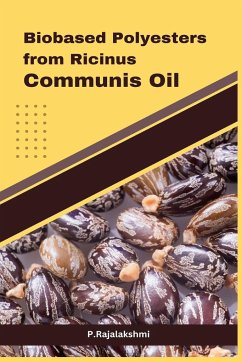The development of biobased polyesters from renewable resources has become increasingly important due to the need for more sustainable materials. Ricinus communis oil, which contains a high percentage of the unsaturated fatty acid ricinoleic acid, is a promising candidate for the synthesis of biobased polyesters. This plant-based oil has many advantages such as being non-toxic, biodegradable, and readily available. In this study, P.Rajalakshmi focused on the physicochemical and biological synthesis of biobased polyesters using ricinoleic acid from Ricinus communis oil as a feedstock. The synthesis of polyesters was achieved via polyesterification, which involves the reaction of the carboxyl group of the ricinoleic acid with the hydroxyl group of a polyol. The resulting biobased polyesters were characterized using various analytical techniques such as Fourier transform infrared spectroscopy (FTIR), nuclear magnetic resonance (NMR), and thermal gravimetric analysis (TGA). The results of the study showed that biobased polyesters synthesized from Ricinus communis oil had good thermal stability and mechanical properties, making them suitable for a wide range of applications such as in the production of fibers, films, and coatings. Additionally, the use of renewable resources for the synthesis of biobased polyesters reduces the reliance on non-renewable resources and promotes the use of sustainable materials. Overall, this study highlights the potential of Ricinus communis oil as a feedstock for the synthesis of biobased polyesters, which can contribute to the development of more sustainable and environmentally friendly polymeric materials. The use of green chemistry principles in the synthesis of biobased polyesters from renewable resources represents a significant step towards a more sustainable future.








